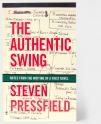Book Review: The Authentic Swing by Steven Pressfield
[by Mark Safranski a.k.a “zen”]
The Authentic Swing by Steven Pressfield
Callie was kind enough to send me a review copy of Steven Pressfield’s new non-fiction book, The Authentic Swing. Much like the title implies, it is a book with an arc.
The Authentic Swing continues a theme Pressfield began with his excellent The War of Art, continued with Do the Work and Turning Pro of helping struggling writers, artists and others conquer their resistance and acquire the mature habits of mind to become creative, productive professionals. While the previous books were advice, The Authentic Swing is a demonstration. Pressfield breaks down for the reader the gestation and evolution of his first successful novel, The Legend of Bagger Vance and applies a granular eye to the creative process but does so without tipping his hand or writing a “cookbook”. Steve is employing all his gifts as a storyteller to lead and nudge the reader into understanding.
There are many parts in the book that I like, but the following is in my view the most important, despite being less colorful and more straightforward than others:
When Robert McKee was a young writer/director in New York, he got the chance to interview Paddy Chayefsky, the only person to have one two Academy Awards for original Screenplay (Marty and Network) Chayefsky shared this priceless nugget:
As soon as I figure out the theme of my play, I type it out in one line and scotch tape it to the front of my typewriter After that, nothing goes into the play that isn’t on-theme.
If there is a single more powerful piece of wisdom for any writer, artist or entrepreneur, I don’t know what it is.
Theme.
Theme is everything.
Once we know the theme we know the climax, we know the protagonist, we know the antagonist, we know the supporting characters, we know the opening, we know the throughline.
I said before that I have a file in my computer titled NEW IDEAS. I have another THEME. for each new project, I open a new file and title it THEME. I go back to this file over and over. I pile paragraph on paragraph, trying to answer the question, “What the hell is this book about?”
It’s hard.
Theme not only drives art, it drives a coherent life. It makes the disparate connected and gives actions unity. We see theme in great innovative companies, in the curriculum of our best university programs, at the core of great religions, in revolutionary political movements and a nation’s grand strategy. Charles Hill, drew on themes of classical literature to teach that very point about foreign policy. This advice is worth the price of the book alone.
Page 1 of 2 | Next page
